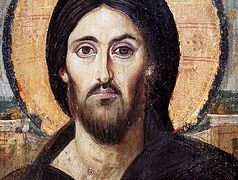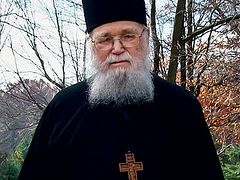Christianity is not a religion of external demands and taboos; it is the worship of God “in spirit and truth” (Jn. 4.23). Our faith must first of all renew the inner person. Then, the inner peace that results from this correction and purification will inevitably manifest itself externally, healing and shaping the outer world aright. Strictly speaking, the external world can only undergo changes for the good, when acting in it are people who have themselves been renewed internally.
Our faith, then, is the life of the inner person, a life [lived] before the face of the One “who sees [what is done] in secret” and “rewards [us] openly” (Mt 6.4).
Let us look at the main Christian prayer—the Our Father—from the point of view of the inner person. But, before we do so, let us listen to what St. Tikhon of Zadonsk says about the heart: “The heart is the beginning and the root of all our doings. It is with the heart that we either believe or don’t believe; it is with the heart that we love or hate, humble ourselves or fill ourselves with pride, endure things or grumble about them, make peace or quarrel, turn towards God or distance ourselves from Him; it is our heart that either blesses or curses.”
Consequently what does not exist in the heart does not, in fact, exist at all. If they are not in the heart, faith is not faith and love is not love; they are mere hypocrisy. Meekness is not meekness but pretence, if it does not come from the heart; friendship is not friendship but worse than enmity, if it is only a surface manifestation and is not found in the heart. This is why it is our heart that God requires of us: “My son, give me your heart” (Prov 23.26).
Let us look now at the Lord’s Prayer.
“Hallowed be Thy name”—these words are said immediately after calling upon God as Father. We must discuss the fact that the main manifestation of His glory comes through His Incarnation as a human being. Our Lord wants to enter our world and to sanctify everything within our heart by His presence. We shall not be able to glorify Him in the way that we should, until we become His temple and the place of His dwelling.
Is it genuine glory for the Creator to be glorified by the sun and moon and not by man? By no means! Our Lord, who “gathers the waters of the sea as in a bottle; who lays up the deeps in treasuries” (Ps 32.7) and sets His seal upon the whole of the created world, wants every person to allow space for God’s glory inside themselves. “Gladden my heart,” says the prophet, “that I may fear Thy name” (Ps 85.11), and we too must ask for the same.
Next, in the Lord’s Prayer, we say the following: “Thy Kingdom come”. But where should this Kingdom come, if not first into the heart of a human being? We read in the Gospel that when Jesus was asked by the Pharisees when the kingdom of God would come, he replied as follows: “The kingdom of God does not come with observation, nor will they say ‘See here!’ or ‘See there!’ For indeed the kingdom of God is within you” (Lk 17.20–21). If that kingdom is not present within us, then any glorious exterior action will not be fully glorious or useful to a person. A king will have no real glory, an athlete no strength, a scholar no intellect, if, having achieved external success, they continue to suffer from envy, suspicion or impure thoughts. “No,” —we should say—“let the kingdom of God come into my heart first, and then everything else will follow. If not, there will be no firm victory and no final triumph.”
In Genesis, sinful man was called “dust”: “For dust thou art and unto dust shalt thou return” (Gen 3.19). What is dust, if not the earthly matter that we tread on day by day? If we too are earth, then, inside our heart there is a small piece of that earth. Thus when we say, “Thy will be done on earth as it is in heaven,” we should bear in mind the earth of our heart. In heaven it is the ranks of angels who do the will of God. May His will be done in the human heart with the same angelic speed and desire!
An angel does not eat bread, but feeds on God. A human being, on the other hand, does eat bread but “does not live by bread alone, but by every word that proceeds from the mouth of God” (Deut 8.3) and by fulfilling the will of the Lord. `“My food,” said Jesus, “is to do the will of Him who sent me and to finish His work” (Jn 4.34). Since this is what the New Adam says, then those who have been reborn in Him should think likewise. The bread that we ask for when we pray “Give us this day our daily bread” refers to normal bread, but at the same time to the will of God and the word of God, and also, of course, to Holy Communion. All this concerns not only man’s flesh but in particular his heart—because, as it is said, “bread strengthens man’s heart” (Ps 104.15).
When it comes to forgiving mutual trespasses, how can we fail to take the heart into consideration? Can we just forgive in words without working hard on ourselves and without expelling from our hearts every trace of rancour and slyness, every selfish and predatory attitude towards our neighbour? If we want to be Christ’s disciples, we cannot approach forgiveness in any other way. It is no use smearing our lips with honey, when there is poison in our heart. In his parable about a king who decided to settle accounts with his servants, the Lord says to the wicked ones: “So also my heavenly Father will do to every one of you, if you do not forgive your brother from your heart” (Mt 18.35).
When we ask not to be led into temptation, we do so because we know that the enemy is cunning and that we are weak. In the supplication “lead us not into temptation,” one detects the voice of an honest yet frail human being, someone who does not think too highly of himself. However, the devil cannot force us to commit sins, but he can invite us to do so by means of lies and seduction. Sometimes he lures us with pleasures of the flesh, sometimes with tantalizing glimpses of what seems on the surface to be good, and sometimes even with miracles. In reserve he has a stock of all kinds of trumpery for an unequal bargain with us. “Give me your soul,” he says. And what does he give us in return? A glittering, worthless bauble.
We would never be deceived by any of this, had sin not made a nest in our hearts. But that nest has been built, and it is from there, from “out of the heart that come evil thoughts, murder, adultery, sexual immorality, theft, false witness, slander” (Mt 15.19). Having got poison within ourselves, what can we do in order not to be poisoned from without? This is why we pray that we be spared from inclinations to sin and that our heart be prevented from deviating from the right path.
At the beginning of the prayer, we called upon God the Father and remembered Him with love. Now, as we come to the end, we must also mention Satan, he who fell from heaven like lightning. He is at war with us. He doesn’t love us and never will. He wants us to be partakers and inheritors of his own fate, which is one of anguish and suffering, insatiable anger and an existence that is meaningless. He was good once but not anymore, and he will never become good again. Envy gnaws away at him and it is unbearable for him to see how weak people receive places in the blessed kingdom of God which neither he nor the spirits that followed him will ever receive again. This is why he declared war on us.
We did not start this war; it had been unleashed long before we were born. However, we entered the fray as soon as we received holy Baptism. For, as it is said, “we are not contending against flesh and blood, but against the principalities, against the powers, against the world rulers of this present darkness, against the spiritual hosts of wickedness in the heavenly places” (Eph. 6.12). The main thing in a war is to have a brave heart. Neither new weapons nor clever strategies can win a war, if there are no brave hearts. In this special war, we need not only bravery but also our own firm faith and continuous help from God. We must take up “the shield of faith, with which [we] can quench all the flaming darts of the evil one” (Eph. 6.16). According to St Tikhon of Zadonsk, as we saw, our faith lives in the heart and if there is no faith in our heart, then there is no faith at all. Therefore, in the supplication “deliver us from the evil one” we are asking precisely for the gift of faith in our heart. In other words, we are asking God to protect our heart with a shield of faith and for it not to be pierced by a poisoned arrow of the enemy.
To conclude, we see that the whole of the Lord’s Prayer concerns a person’s inner world. This means that it should be pronounced not only by the mouth but by our inner person. That inner part of us of which it is said: “renew a right spirit within me” (Ps 50.10). That inner self and those depths of our soul about which it is written: “Out of the depths have I cried to Thee, O Lord” (Ps 129.1). So, as we pray from the bottom of our heart, frequently calling upon the name of our heavenly Father, let us progress towards the fulfilling in us of the words of St Paul, who knelt in supplication before our Lord, praying that “that according to the riches of His glory He may grant [us] to be strengthened with might through His Spirit in the inner man, and that Christ may dwell in [our] hearts through faith” (Eph 3.16–17).
From, Religion of the Heart, by Archpriest Andrei Tkachev (Vozdvizhenie, 2015).




